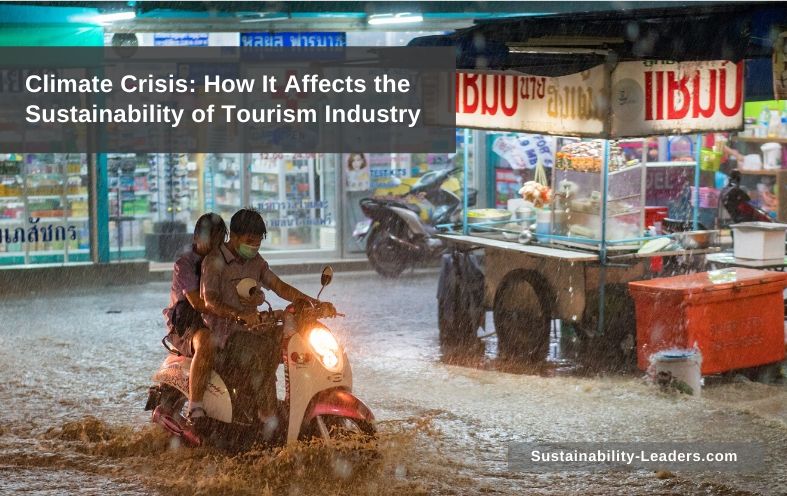
Tourism is an industry that contributes significantly to the local economy. It is also among the most affected during testing times – be it the current coronavirus pandemic or the looming climate crisis. But how exactly will the climate crisis impact the sustainability of travel businesses and destinations?
We asked our panel of sustainable tourism specialists. Below the answers (highlighted respondents are available as consultants or speakers).
A few key takeaways:
- Climate change impacts the natural environment through coral bleaching, reduced snowfall, floods, hurricanes, etc. This affects the desirability of a destination, leading to fewer visitors.
- Less visitors means that economies of scale no longer work out, affecting hotel occupancy levels and room rates.
- Many destinations will lose tourist hotspots like beaches, islands, or ecologically sensitive areas in the near future, due to the climate crisis.
- Eco resorts or lodges located in pristine locations will be severely affected. One example being the damage to property and livelihoods during the recent Australian bush-fires.
- Destinations like the Caribbean and small island nations that rely heavily on the sea and beach life to attract visitors, will be seriously affected by rising sea levels, leaving the locals vulnerable to financial instability.
- On the brighter side, other destinations might become more attractive as they benefit from a warmer climate and longer season.
Brian Mullis
Interview | Speaker profile
There is a pressing need to clearly identify the positive environmental, economic and social benefits associated with international travel. Consumers and the media are increasingly asking the question: If Seeing the World Helps Ruin It, Should We Stay Home? This is resulting in an increasing number of travelers cancelling their flights and international travel plans because they do not believe they can justify the impact on the environment.
The problem is that the media is not providing accurate data, complete information or the requisite context. By contrast, the independent peer-reviewed research literature on this matter is conclusive.
- Air travel accounts for around 10% of the total carbon footprint associated with tourism.
- Species extinction is caused predominantly by overexploitation and habitat removal, with climate change being responsible for around 7% of species loss.
- Case studies worldwide prove that well-managed sustainable tourism can provide new economic, social and environmental benefits to host communities.
Biodiversity protection requires sustainable ecosystem management and the conservation of large tracts of connected wildlife habitat. Furthermore, vast tracts of protected forests provide a global carbon benefit that can be realized by local communities. Nature-based tourism provides new livelihood opportunities for local communities that generate direct economic and social benefits. Well-managed tourism, therefore, incentivizes the conservation of wildlife and wildlife habitats, reduces forest degradation and influences changes in land-use practices, all of which support sustainable development.
The Guyana Tourism Authority endeavors to change the current narrative by clearly identifying, completing as necessary, and sharing the relevant research and amplifying the message that the tangible environmental, economic and social benefits associated with well-managed tourism destinations outweigh the costs of carbon emissions associated with the related flights to visit them.
 Jonathon Day
Jonathon Day
Interview | Speaker profile
Anticipating the direct impacts of climate change is straight-forward. The climate predictions are solid. Much of our conversation to date has addressed direct impacts like the rise of sea levels and retreat of snow cover. These are important issues but they only scratch the surface.
The real challenge is understanding the indirect impact on destinations and businesses. Tourism is a complex system and changes can happen in unanticipated ways. Those changes may be specifically related to tourism, or tourism may just be a bit player in a larger problem.
For instance, what if the flows of travelers may change as currently popular destinations become hotter and wetter, or hotter and dryer. Indeed, with the rise of flight shaming, it is far easier to see a world where travel itself may not be as socially acceptable as it is today.
Or on a different scale, what if cities lack water to support their own citizens, let alone tourists? Tourism must take an active role in responding to climate change. As an important stakeholder group in the global community, we must ensure that there are meaningful changes across society.
 Kelly Bricker
Kelly Bricker
Interview | Speaker profile
We are inherently dependent on the health of the environment for the health of humankind, business, etc. When the environment reacts to negative impacts, it impacts us all.
We are already seeing sea level rises impacting communities, coral bleaching, unusual impacts on migrations, weather impacts on communities, to name a few. All of these have direct linkages to how a business hosting tourism can respond and continue. These are stark realities of tourism and especially bleak realities in light of the current pandemic.

Kirsi Hyvaerinen
Interview | Speaker profile
Depending on where businesses operate and with what goal – situations can vary. Some may gain, for example through seasonal and regional extensions, and others may lose their business for the same type of change, i.e. warming. Generally, we cannot continue asking travel trade questions, separating tourism from the severe consequences of global warming, such as drought, locusts, fires, floods – which destroy the basis of life, i.e. farming in huge areas.
Again, it depends which destination we look at and with which time frame. The worst-case scenario would be that small island and beach destinations are lost forever – and migration for survival would become the main reason to hit the road; it’s already happening.
If I simply look at my own surroundings – the mountains of Montenegro – the change is already visible. Mid-January, when Australia was burning, we also had extremely dry grounds and forest fires, instead of snow worth months of skiing, and consequently winter tourism. This will probably extend to severe water problems in summer.
 Willy Legrand
Willy Legrand
Interview | Speaker profile
The tourism industry’s growth regularly exceeds the global economy (UNWTO, 2020) but it is also vulnerable to extreme events as we are currently facing with COVID-19. The industry has experienced multiple crises over the past 50 years, with the most recent being 9/11, SARS, and the Global Financial Crisis.
What is common to those crises is that the travel and tourism industry has eventually bounced back. And one aspect that has come to light quite clearly once a crisis is overcome: the industry is hungry for resources, thus it is a contributor to climate-related challenges while at the same time also directly affected by changes in the environment.
Whether operating a ski resort in the Alps or a coastal retreat, whether sourcing food locally or organically, the effects of climate change are felt first-hand. Climate change threatens the industry in many different ways, environmentally, financially, and socially. For example, many hotels are located in destinations where the natural environment is seen as being desirable for guests; this may be a nice beach, a coral reef, a pristine forest or a beautiful savannah.
Degradation of those natural environments due to climate change has a direct impact on the desirability of those destinations (e.g. beach erosion; endangered reef ecosystem, forest fires, biodiversity collapse) with an effect on the occupancy levels and rates a hotel can charge customers. The list of climate change effects on the natural environment is long and the hotel industry relies on this environment for its business.
If we consider hospitality operations, for example, while focusing on the environmental aspect of sustainability, the sector requires resources all along the life cycle of the operations and in turn, creates multiple impacts. These include:
- the planning, building, and construction of the facilities
- the manufacturing use of fixtures and fittings
- the cultivation, production and shipping of food
- the sourcing, transport, and burning of fossil fuels for facility-operating purposes as well as for services offered
- the water use and depletion
- the various wastes produced from operation
- disposal of buildings at the end of the life cycle
- the transport of employees and guests to and from the facilities
In all of those steps, climate change affects the industry. Pretend an investor wishes to establish a new resort on a low-lying island. A detailed risk assessment must be devised in choosing the correct location for a new hotel when considering the climate scenario:
- What happens with seawater levels in 20, 30, or 50 years?
- Additionally, how will the resort be heated, cooled, or ventilated?
- Are there sources of energy readily available?
- What food can be served to the guests, where does it come from and how do we ensure a stable procurement?
- How do we manage the waste created at the property?
- With rising seawater levels, how do we ensure freshwater availability?
Many destinations have already felt the direct effect of climate change and a shortage of resources.
Amine Ahlafi
Interview
Climate is one of the key attraction inputs that a destination highlights when it comes to promotion and marketing. Any change or loss of climatic characteristics due to the climate crisis may have a crucial impact on a destination’s attractiveness and richness of its biodiversity, mostly perceived as an asset of the tourism industry, within a destination.
Also, an increase in the awareness of the impacts caused by the climate crisis would affect the decision of travelling and of choosing certain destinations. Avoiding air transport and tourism facilities not engaged in sustainability could be some of the direct outcomes.
The destination not driving its actions towards sustainability in its priorities and strategies would be affected by the degradation of the tourism economy. This situation could be catastrophic for certain destinations focusing their economy on the tourism industry via the reduction of the turnover and the economic dynamics of this sector.
Sustainable tourism, with the commitment of all the destination stakeholders, could be an alternative to deal with this scenario.
Anna Spenceley
Interview
We’re increasingly aware of the threat of climate change and concerned about the incidences of extreme droughts, floods, melting glaciers and bushfires across the world. We want to travel – we want to contribute towards local economies as we do so – but how do we do it without contributing to global climate change?
In 2018, the UN Intergovernmental Panel on Climate Change (IPCC) issued a special report stating that we have just over a decade to restrict global warming to 1.5oC above pre-industrial levels if we are to avoid extreme floods, droughts and heat.
The climate crisis affects the sustainability of tourism businesses and destinations, and both need to take action to reduce their contribution to it and to improve their resilience to climate change shocks that take place.
Jeremy Sampson
Interview
We know from sources like the World Economic Forum that the top 5 most likely long-term risks are all climate-related. Just like with COVID-19, travel and tourism are set to feel the full force of these impacts given the majority of its assets are located on coastal, island, fragile or already-stressed ecosystems.
Put simply, the climate crisis renders the future of our sector incredibly vulnerable. Of course, I’m writing this from home in the context of the current COVID-19 lockdown, and I am conscious of two things:
- When the need is perceived to be urgent enough, we can achieve many things that were previously considered unthinkable or impossible. New ideas and options are looked for and adopted. That gives me hope for the future.
- Here in the UK and in many other parts of the world, we’re all practicing a form of social distancing in order to maintain a more healthy community and avoid taxing an already stressed health service. A parallel might be drawn with the climate emergency and global travel. While certain forms of travel remain a threat to our planet, what might tourism need to look like in the future? Can we take some lessons from the current situation and apply them to future travel products and experiences, in order to put less stress on our communities and resources?
Jonathan Tourtellot
Interview
Some of the consequences of the climate crisis which businesses and destinations should anticipate:
- Increasing controls on transportation emissions, energy usage.
- Sea level rise, local food supply chains, ecosystem disruptions (especially insect interactions).
Kevin Teng
Interview
Our climate is essential to the long-term outlook of tourism and our destination. This involves resilience, building management, and ultimately ensuring that we are able to continue to provide an amazing experience for our guests.
Masaru Takayama
Interview
It first affects the short term financial sustainability for tourism businesses, especially for the ones that deal with overseas visitors, while destinations face many challenges to take immediate action such as creating a rescue package for the ones badly affected –
- financing with no interest, with long-term payback to secure staff members
- re-create crisis management including setting the worst-case scenario as the situation may get worse
- procure public funds to promote the sector to be ready before things go back to normal
On the other hand, some areas which were normally heavily visited have a chance to recover environmentally. The animals may start to claim their territory that had previously been overtaken by humans, and the air/water quality may improve as the emissions from the motorized vehicles decline.
Natalia Naranjo Ramos
Interview
The world is always changing and the conditions are more unstable now than ever before; with technology, communications and information (and it seems diseases also) that spread rapidly through countries around the world. Everything is so fast now that change will be constant.
Tourism businesses and destinations have to adapt to the circumstances. The fundamentals anyway, will be how to adapt properly each time, how we as humans decide to go and direct our efforts as a species.
We have to act towards life and protection if we want to survive, and that will be the best and wise answer for business people, political, environmental and social leaders.
The question then will be: climate crisis – how does it affect the survival of our species and how can we deal with it through our businesses and destinations, as human beings? It sounds profound and difficult but also possible and urgent.
Rachel Dodds
Interview
A changing climate will affect almost all destinations, however some positively – e.g. warmer weather may extend seasonality in some destinations whereas it may destroy other habitats.
A key thing to realise, however, is that we need to focus on sustainability overall – the climate is only one element and I worry that, to focus only on one thing leads us to forget about other equally important areas.
For example, a company should understand their emissions and impacts but not forget about their overall environmental and social responsibility. Sustainability is a holistic concept and we need to be aware and act on becoming more responsible as an industry overall.
Case in point, if the world spent even 1/4th of the energy that we are spending on fighting the coronavirus towards being more sustainable, we probably would be much further ahead.
Steve Noakes
Interview
In the second half of 2019 and into 2020, we had an extended and very bad bushfire period in Australia. From the tourism perspective, our Binna Burra Lodge was the first significant iconic tourism resort destroyed in some seven months of bushfires across the nation.
In our case, the cause of the fire was reported by police two months after the fire – it was due to two teenagers throwing away cigarette butts some 10+ km down the valley. The strong winds and dry conditions drove the wildfire south towards our community and the lodge. Eleven houses were lost, as well as heritage buildings at Binna Burra Lodge.
The fire was not caused by ‘climate change’ but there is more than adequate science to indicate that climate change exacerbated the intensity and reach of the wildfires into our world heritage listed sub-tropical rainforest, which is usually moist and naturally bushfire resistant. Clearly, climate change is now directly affecting our business and our destination.
Vik Nair
Interview
Tourism’s annual carbon footprint has grown rapidly and looks set to continue if a ‘business-as-usual scenario’ remains. The state of the environment will inevitably impact the tourism industry across the globe, which includes tourism businesses and destinations. Hence, the impact due to the climate crisis may be at a tipping point.
If we still regard the climate crisis as ‘fake news’ or exaggeration of the real situation, we will fail our responsibility to react for the future generation.
More and more reports have indicated that half of the world’s sandy beaches could disappear by 2100 if no action or limited action is taken to reduce greenhouse gas emissions. This impacts countries in the Caribbean the most, as they are mainly reliant on the ‘sun, sand and sea’ products.
Tourism is the major contributor to the economy of countries in the Caribbean. The climate crisis has impacted the sustainability of the Caribbean significantly as a destination and its impact on tourism businesses is evident.
There already exists scientific evidence through comparison of satellite images on the changes in shoreline from 1984 to 2016 that indicate a quarter of sandy beaches worldwide has already eroded at an alarming rate of 0.5 meters per year (which is approximately 28,000 square kilometers of land disappearing). Thus, more destinations will cease to exist.
Besides the Caribbean, other destinations that are in danger include the sandy beaches in Gambia, Guinea-Bissau, many parts of Australia, Kiribati, the Marshall Islands, Tuvalu, Maldives, Federated States of Micronesia, French Polynesia, Nauru, Palau, Seychelles, Tonga, Comoros, Solomon Islands, Fiji, Cook Islands, Marshall Islands, and Bangladesh. Coastlines of other major destinations can also be impacted due to the climate crisis.
More about the sustainable tourism expert panel here – including previous sessions and answers to some of the most pressing issues linked to making tourism more sustainable.
Do you have a topic in mind that you think needs to be highlighted in 2020? Get in touch!












